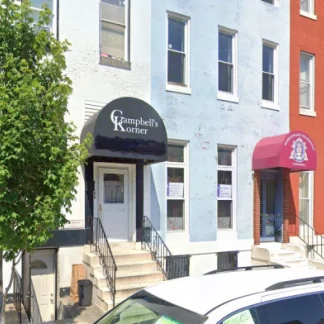The Baltimore Station
The Baltimore Station is an innovative therapeutic residential treatment program...
Located in Baltimore, Maryland, A Step Forward provides alcohol and drug rehab services, along with mental health treatment to men and women throughout the county. They provide residential treatment, intensive outpatient treatment and outpatient treatment. Individuals with dual diagnosis are also welcome to receive treatment.
A Step Forward offers addiction and mental health services to individuals from all walks of life, including those living with HIV/AIDS, individuals struggling with homelessness, and those who have recently been incarcerated. Services include:
24/7 monitoring is provided for those who need a high level of care in an environment outside of their home. Various forms of therapy such as individual therapy, group therapy, and family therapy are provided. Educational classes and life skills training are also offered.
As a step down from residential treatment, clients meet regularly throughout the week. They participate in individual therapy, group therapy, and family therapy.
The outpatient program includes therapy and self-help groups. It also includes DWI/DUI programming, psychiatric care, and drug court.
Contact us for more information: (410) 462-6001

Connect with A Step Forward by calling their admissions team directly.
(410) 462-6001 Website Get DirectionsExperiential therapy is a form of therapy in which clients are encouraged to surface and work through subconscious issues by engaging in real-time experiences. Experiential therapy departs from traditional talk therapy by involving the body, and having clients engage in activities, movements, and physical and emotional expression. This can involve role-play or using props (which can include other people). Experiential therapy can help people process trauma, memories, and emotion quickly, deeply, and in a lasting fashion, leading to substantial and impactful healing.
Group counseling is a form of therapy, which posits that people benefit from shared experiences. Usually group counseling is focused on a particular issue, for example obsessive-compulsive disorder or anger management. One of the main principals behind group counseling is the idea that dealing with specific issues may cause isolation, and a feeling that one is alone in facing one’s problems.
Individual counseling is a collaborative process in which a unique, confidential helping relationship is developed between a counselor and a willing client (student/Client). In this relationship, the professional counselor acts as a facilitator to help the client to understand more accurately his/herself and the world around him/her.
Life skills trainings involve all the skills a person must have in order to function successfully in the world. These include time management, career guidance, money management, and effective communication. Truly successful addiction recovery is based on the ability to not only live substance-free, but to thrive. Life skills teaches the practical necessities of functioning in society, which sets clients up for success in life, and therefore sobriety.
Group counseling is a form of therapy, which posits that people benefit from shared experiences. Usually group counseling is focused on a particular issue, for example obsessive-compulsive disorder or anger management. One of the main principals behind group counseling is the idea that dealing with specific issues may cause isolation, and a feeling that one is alone in facing one’s problems.
Individual counseling is a collaborative process in which a unique, confidential helping relationship is developed between a counselor and a willing client (student/Client). In this relationship, the professional counselor acts as a facilitator to help the client to understand more accurately his/herself and the world around him/her.
Life skills trainings involve all the skills a person must have in order to function successfully in the world. These include time management, career guidance, money management, and effective communication. Truly successful addiction recovery is based on the ability to not only live substance-free, but to thrive. Life skills teaches the practical necessities of functioning in society, which sets clients up for success in life, and therefore sobriety.
Individual counseling is a collaborative process in which a unique, confidential helping relationship is developed between a counselor and a willing client (student/Client). In this relationship, the professional counselor acts as a facilitator to help the client to understand more accurately his/herself and the world around him/her.
Life skills trainings involve all the skills a person must have in order to function successfully in the world. These include time management, career guidance, money management, and effective communication. Truly successful addiction recovery is based on the ability to not only live substance-free, but to thrive. Life skills teaches the practical necessities of functioning in society, which sets clients up for success in life, and therefore sobriety.
Life skills trainings involve all the skills a person must have in order to function successfully in the world. These include time management, career guidance, money management, and effective communication. Truly successful addiction recovery is based on the ability to not only live substance-free, but to thrive. Life skills teaches the practical necessities of functioning in society, which sets clients up for success in life, and therefore sobriety.
The Baltimore Station is an innovative therapeutic residential treatment program...
EPOCH Counseling Center West is a private rehab located in Catonsville, Maryland...
JR Healthcare – Behavioral Health is a private rehab located in Baltimore, Maryl...
Freedom Advocates Celebrating Ex Offenders - FACE is a non-profit rehab located ...